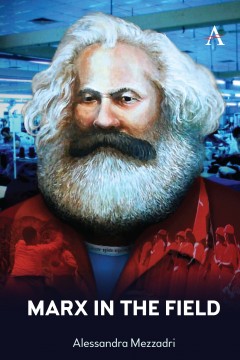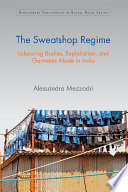Mezzadri Alessandra
Senior lecturer, SOAS University of London
Website
Membership statement
Alessandra is a feminist political economist based at SOAS, London, in the department of Development Studies. She has done extensive fieldwork in India, across multiple urban, peri-urban and rural sites. Her earlier research work has focused on the architecture of production, regional labour regimes and localized patterns of labour control characterizing the Indian export-oriented garment industry; on the incorporation of India into the global garment commodity chain; and on the limitations of corporate labour standards for labour in global commodity chains and production networks. Her more recent work has focused on the specific features and complex organization of the ‘Sweatshop Regime’ in factories and home-based settings in India; on labour contracting in global production; on the links between productive and reproductive realms of work, and on the interplays between labour regimes, the labouring body and health outcomes. Her research has been funded by the ESRC-DfiD (project ‘Labour standards and the working Poor in China and India’) and by the British Academy (project ‘The global Village? Homeworking in the global economy’). She is the author of The Sweatshop regime: Labouring Bodies, Exploitation, and Garments Made in India (CUP, 2017).
Alessandra is currently working on Marxian analysis as fieldwork method; on the links between social reproduction and informal labour; on productive and reproductive temporalities of exploitation in global commodity chains, including post-work dynamics; on the politics of global labour standards, Modern Slavery and labour unfreedom; and on gender, labour and globalisation. Since March 2020, she has also been researching and writing on COVID-19, PPE chains, and social reproduction.
 Marx in the Field (Anthem, Frontiers of Global Political Economy and Development Series)
Marx in the Field (Anthem, Frontiers of Global Political Economy and Development Series)
 The Sweatshop Regime: Labouring Bodies, Exploitation and Garments Made in India. Cambridge: Cambridge University Press.
The Sweatshop Regime: Labouring Bodies, Exploitation and Garments Made in India. Cambridge: Cambridge University Press.
Resources
- Towards a Feminist Political Economy of Time Labour Circulation, Social Reproduction & the ‘Afterlife’ of Cheap Labour.
- A Value Theory of Inclusion: Informal Labour, The Homeworker and the Social Reproduction of Value.
- Hidden Abodes in Plain Sight: The Social Reproduction of Households and Labour in the COVID-19 pandemic.
- The Informal Labours of Social Reproduction.
- On the value of social reproduction: Informal labour, the majority world and the need for inclusive theories and politics.
- ‘Classes of Labour’ at the Margins of Global Commodity Chains in India and China.
- Health and Safety in Garment Workers’ Lives: Setting a New Research Agenda.
- Class, gender and the sweatshop: on the nexus between labour commodification and exploitation.
- The informalization of capital and interlocking in labour contracting networks.
- Why inequality matters – for the rich and the poor.
- A ‘song of the wage’ for Rana Plaza.
- Free to stitch, or starve: capitalism and unfreedom in the global garment industry.
- Are Ethical Initiatives Successful in the Indian Garment Industry? A Focus on Homeworkers.
- Backshoring, local sweatshop regimes and CSR in India.
- Indian Garment Clusters and CSR Norms: Incompatible Agendas at the Bottom of the Garment Commodity Chain.
- Cambodian sweatshop protests reveal the blood on our clothes.
- Reflections on Globalisation and Labour Standards in the Indian Garment Industry: Codes of Conduct Versus ‘Codes of Practice’ Imposed by the Firm.
- How Globalised Production Exploits Informal-Sector Workers: Investigating the Indian Garment Sector.
- The rise of neo-liberal globalisation and the ‘new old’ social regulation of labour: the case of Delhi garment sector.
- Backshoring, local sweatshop regimes and CSR in India
- Global commodity chains, production networks and informal work
- Garment Sweatshop Regimes: The Informalisation of Social Responsibility over Health and Safety Provisions', Working paper 30/2015. CDPR.
- Labour regimes in the Indian garment sector: capital-labour relations, social reproduction and labour standards in the National Capital Region. CDPR SOAS:
- Indian Garment Clusters and CSR Norms: Incompatible Agendas at the Bottom of the Garment Commodity Chain
- Working poverty in many sizes: A survey of Delhi garment workers challenges key assumptions in the labour standards debate
- Modern slavery and the gendered paradoxes of labour unfreedom
- Machines: Watch this documentary to understand the working poverty of the sweatshop
- The march out of the sweatshop: on work and life after the garment factory
- Rana Plaza, Six Years On: We Will Not Shop Where We Cannot Struggle
- Review of: 'We the Workers'. Directed by Wen Hai. New York: Icarus Films, 2017. 174 minutes
- All is revealed: how productivity barely covers anything in fast fashion prices
- A crisis like no other: social reproduction and the regeneration of capitalist life during the COVID-19 pandemic
- The Time and Gender of GVCs: 3 Critical Points on the GVC & Development Report 2019
- How Asia’s clothing factories switched to making PPE – but sweatshop problems live on
- Garment Sweatshop Regimes: The Informalisation of Social Responsibility over Health and Safety Provisions
- Labour regimes in the Indian garment sector: capital-labour relations, social reproduction and labour standards in the National Capital Region
- The Triple Absence of Labour Rights: Triangular Labour Relations and Informalisation in the Construction and Garment Sectors in Delhi and Shanghai
- Labour Control Regimes and Social Reproduction: Some Reflections on the Strengths and Weaknesses of an Evolving Framework
- Sweatshop Economics, the Poverty of Trade Theory and the Making of Inequality Across Scales
- Marx in the Field
- The Sweatshop Regime: Labouring Bodies, Exploitation and Garments Made in India
